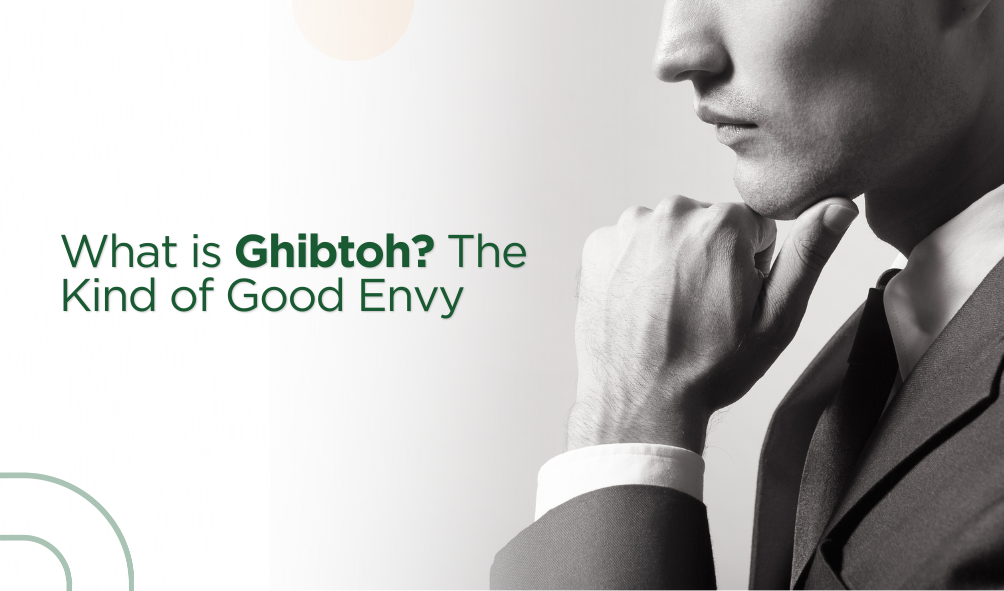What is Ghibtoh? The Kind of Good Envy
Have you ever seen a friend whose business is booming, sales are rising, and customers are becoming more loyal, and then you feel a burning sensation? Sometimes a small whisper arises, “Why can he do it, but not me?”
Well, that feeling can certainly happen to us. But what matters isn’t whether we’ve ever been jealous, but rather where that envy leads us .
In Islam, envy isn’t always bad. There’s a type of envy that can actually be rewarding, called ghibtoh. This type of envy isn’t about wanting to bring others down, but about wanting to be as good as, or even better than, them, in a way that pleases Allah .
If the heart can manage ghibtoh properly, envy can actually fuel self-improvement and enhance the quality of one’s efforts. It can even be a prayer to ward off envy , keeping the heart pure and intentions pure.
What is Ghibtoh
According to the Shari’a, ghibtoh is a feeling of envy that motivates someone to imitate the goodness of others without hoping that the goodness will disappear from them.
Imam An-Nawawi explained that ghibtoh is a permissible trait, even praiseworthy, as long as it is directed at things that bring one closer to Allah ﷻ .
Rasulullah ﷺ said :
لَا حَسَدَ إِلَّا فِي اثْنَتَيْنِ: رَجُلٍ آتَاهُ اللهُ مَالًا فَسَلَّطَهُ عَلَى هَلَكَتِهِ فِي الْحَقِّ، وَرَجُلٍ آتَاهُ اللهُ الْحِكْمَةَ فَهُوَ يَقْضِي بِهَا وَيُعَلِّمُهَا
“Do not wish to be like anyone except in two cases. (The first is) A person, whom Allah has given wealth and he spends it righteously; (the second is) the one whom Allah has given wisdom (the Holy Qur’an) and he acts according to it and teaches it to others.” (Hadith narrated by Al-Bukhari )
This means that justified envy isn’t solely about wealth, but about its usefulness. In the business world, envy arises when we see entrepreneurs who are honest and fair to their employees, yet still successful.
Our hearts are moved, wanting to have such a blessed business, not wanting it to fail. In situations like this, we must also always pray to ward off envy and help keep our enthusiasm from turning into jealousy.
Also read: The Benefit of Investing Since Youth
Ghibtoh vs Hasad
This is where a common misunderstanding arises. Ghibtoh and hasad both stem from envy, but the intentions behind them are very different.
Ghibtoh is wanting to have the same goodness without wanting badness for others, whereas hasad actually wants that person’s goodness to disappear.
In our work life, for example, a colleague gets promoted for their hard work and expertise. If we’re filled with ghibtoh (reward), we might think, “Masha Allah, I want to be like them too. I have to learn and improve myself.”
But if we are jealous, we will look for reasons to bring him down, such as accusing him of, “He must be sucking up to the boss.”
Ibn Qayyim (may Allah have mercy on him) once said, “Hasad first burns the heart of the person who is envious before it burns the person who is envied.”
So, a person trapped in envy is actually torturing themselves. Their heart is hot, their mind is dark, and their life feels limited.
Conversely, ghibtoh broadens the heart. It fosters a spirit of change without spreading hatred. This kind of envy actually fosters self-improvement, not eroding blessings. Therefore, praying to ward off envy is an important practice to ensure our intentions remain pure from hidden envy.
Also read: How to Earn Halal Income in Tough Times
Managing Ghibtoh in the Business World
In the competitive business world, ghibtoh can be a powerful force if properly directed. Seeing others succeed shouldn’t be a reason to feel discouraged, but rather an opportunity to learn and improve.
If your heart starts to feel jealous, start with a prayer to ward off jealousy, be sure that this is not just lip service, but a request that Allah protect your heart from the disease of envy and replace it with a sincere spirit.
Rasulullah ﷺ once said:
الدُّعَاءُ سِلَاحُ الْمُؤْمِنِ
“Prayer is the weapon of the believer.” (Hadith narrated by Al-Hakim)
Prayer isn’t just a request for sustenance, but also a way to cleanse the heart of the poison of envy. This way, we won’t be blinded by envy, which blinds our vision, but instead, we’ll find the courage to grow.
Besides prayer, the key lies in trusting in God. Sometimes we focus too much on results, forgetting that our sustenance is already determined by Allah . We are simply commanded to strive lawfully and honestly.
In the Qur’an, Allah ﷻ says :
هُوَ الَّذِي جَعَلَ لَكُمُ الْأَرْضَ ذَلُولًا فَامْشُوا فِي مَنَاكِبِهَا وَكُلُوا مِنْ رِزْقِهِ ۖ وَإِلَيْهِ النُّشُورُ
” He is the one who make the earth easy for you to explore, so walk in everything corners and eat from His provision. And to Him you will return .” (Qur’an Surah Al-Mulk [67]: 15)
So when we see the success of others, remember that every blessing has its own path. Our job is to strive in a way that pleases them, not to overtake or overthrow them. In true ghibtoh, we learn from others not because we want to replace them, but because we want to improve ourselves.
Also read: The Concept of Sustenance and How It Is Perceived in Islam
Closing
Envy is like fire. If controlled, it can be a warming light. But if left unchecked, it will burn hearts and deeds. Ghibtoh is a form of envy framed by piety, not seeking destruction, but self-improvement.
In this fast-paced business world, ghibtoh can be a blessing if it is directed to foster enthusiasm, increase knowledge, and increase good deeds.
So, if your heart starts to itch when you see someone else succeed, don’t be too quick to reject the feeling. Smile, then whisper to yourself, “O Allah, bless him, and make me a servant who can emulate his goodness for Your sake.” That’s the simplest, yet most powerful, prayer to ward off envy.
Because envy accompanied by faith will transform into a drive toward goodness. And therein lies the secret of true blessing: not who rises the fastest, but who is most sincere in improving.
“Envy managed with piety will ignite the light of enthusiasm, not the fire of hatred.”
Also read: Prophet Sulaiman عليه السلام The Grateful Rich King
Let’s Visit, Zeed and join for halal investment with Zeed.

Reference
Al-Qur’an. Al-Karim.
Al-Bukhari & Muslim. Sahihain , hadith about ghibtoh. Accessed from https://sunnah.com/bukhari:73
Ibn Qayyim al-Jauziyyah. Madarij As-Salikin , Dar al-Kitab al-‘Arabi.
Al-Hakim. Al-Mustadrak ‘ala ash-Shahihain .







